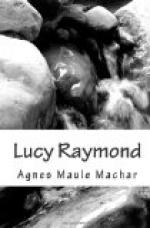“Don’t you think, Stella, I might go to church this evening? I don’t like staying at home all day, and no one would notice what I had on, I’m sure,” she asked her cousin.
Stella opened her eyes. “Do you mean to say you really want to go?” she asked. “I thought people only went to church because it was a duty.”
“I used to go for that reason,” Lucy replied, “but I should be sorry if I only went on that account now.”
“But why? What pleasure can you find in it? The service always seems to me so long, and the sermon so dry, that it makes me yawn so,—I can’t help it.”
Lucy hesitated a little before answering. It was not easy to explain. “There are many things that make it pleasant. One always hears something to do one good,—often the very thing one needs at the very time. It always makes troubles seem lighter, and another world more real and near. I always feel so much nearer papa when I am in church,” she added in a lower tone.
“Oh! that is because you always used to hear him preach, I suppose!” said Stella, not able to comprehend any other reason. “Well, since you like it so much, I’ll ask mamma if you can’t go; but I don’t know whether any of the rest are going.”
Mrs. Brooke, though as much surprised as Stella at Lucy’s strong wish, felt that it ought to be respected. She suggested that, instead of going to the large fashionable church which the family usually attended, they should go to a small one in the neighbourhood, their usual resort on stormy days. Edwin having got tired of the novel he had been yawning over, good-naturedly offered to be her guide and escort; and Stella made no objection when her mother told her she had better go too, as she had not been out in the morning.
The stars were twinkling brilliantly through the clear frosty atmosphere, and the long vistas of gas-lamps, seen on all sides, were a novelty to Lucy’s country eyes. The streets were full of people, encountering each other as they wended their way to church in opposite directions. There were others, too, not going to church, but to very different places of resort; but of these Lucy happily knew nothing.
The first hymn was already being sung when they entered the church, a small, plain building. Lucy was at once interested by the thoughtful, earnest face of the clergyman, who reminded her a little of her father. The first prayer, so simple, yet so full of petitions for the things she most needed, carried her heart with it, till she forgot she was not at home still. The text read was, “A very present help in trouble,” and the sermon was what might have been expected from the tone of the preceding prayer. It was so full of Christ, pointing to His constant presence,—to Him as the only true comforter and sustainer either in sorrow and temptation,—that, simple as was the language and unpretentious the style, it touched the deepest springs in Lucy’s heart, and she leaned back in her seat to hide the soothing, happy tears.




